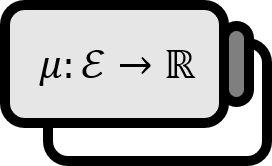Complex Measures, Vector Measures
Definition1
Let $(X,\mathcal{E})$ be a measurable space. A function $\nu : \mathcal{E} \to \mathbb{C}$ that satisfies the following conditions is called a complex measure or vector measure on $(X,\mathcal{E})$.
- (a) $\nu (\varnothing) = 0$
- (b) For mutually disjoint $E_{j} \in \mathcal{E}$, $$ \nu \left( \bigcup \limits_{j=1}^\infty E_{j} \right) = \sum \limits_{1} ^\infty \nu (E_{j}) $$
Explanation
(b) signifies countable additivity. Unlike measures and signed measures, complex measures are defined not to take extended real values. This is because they can take infinite values in any direction. Therefore, a finite signed measure is a complex measure. The complex measure $\nu$ can be divided into a real part and an imaginary part as follows.
$$ \begin{align*} \nu (E) &= \nu_{r} (E) + i \nu_{i} (E) \\ \nu_{r} (E) &= \text{Re} \big( \nu (E) \big) \\ \nu_{i} (E) &= \mathrm{Im} \big( \nu (E) \big) \end{align*} $$
Then, $\nu_{r}$ and $\nu_{i}$ become signed measures with real values. Integration can be naturally extended as follows.
$$ L^1(\nu) \iff L^1(\nu_{r}) \cap L^1 (\nu_{i}) \\ \int f d\nu=\int f d\nu_{r} + i\int f d\nu_{i}\quad \mathrm{for} f\in L^1(\nu) $$
Moreover, two complex measures $\nu$ and $\mu$ being mutually singular means that their real and imaginary parts are singular to each other.
$$ \nu \perp \mu \iff \nu_{a} \perp \mu _{b} \quad \mathrm{for} a,b=r,i $$
Similarly, when $\lambda$ is called a signed measure, if $\nu_{r}$ and $\nu_{i}$ are absolutely continuous with respect to $\lambda$, then the complex measure $\nu$ is said to be absolutely continuous with respect to $\lambda$.
See Also
Gerald B. Folland, Real Analysis: Modern Techniques and Their Applications (2nd Edition, 1999), p93 ↩︎
